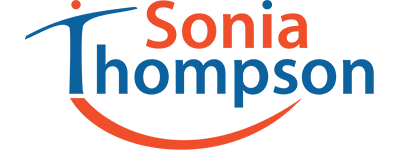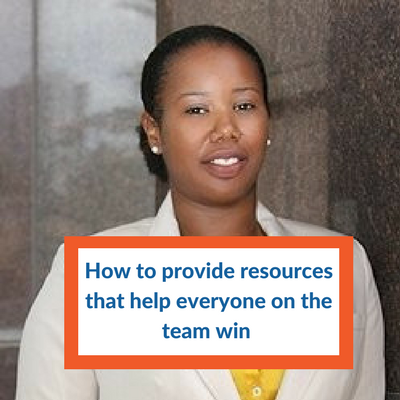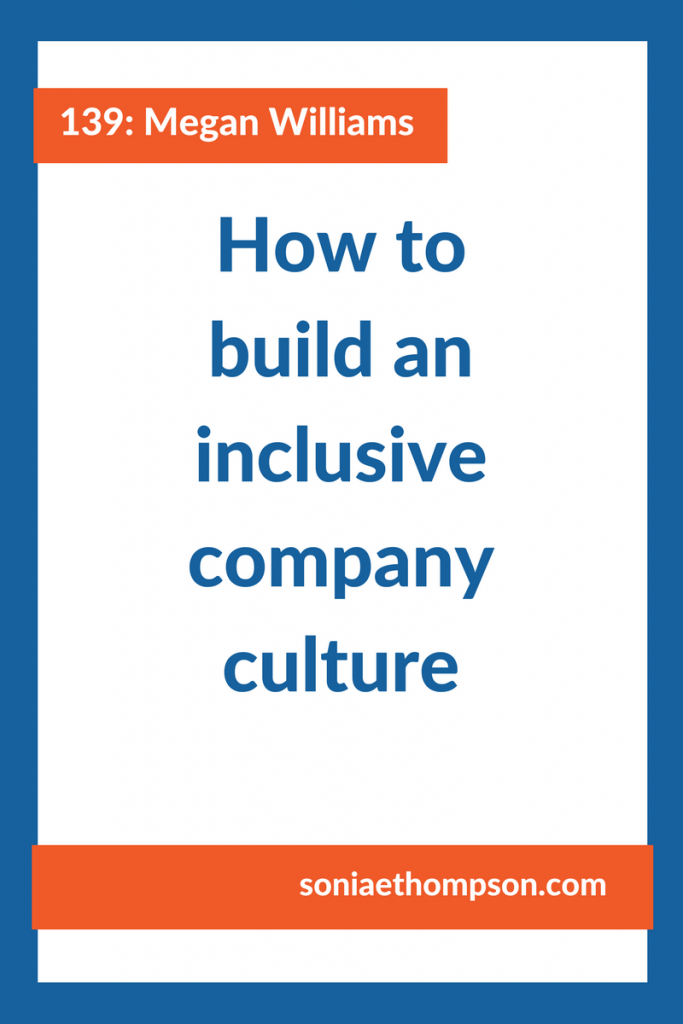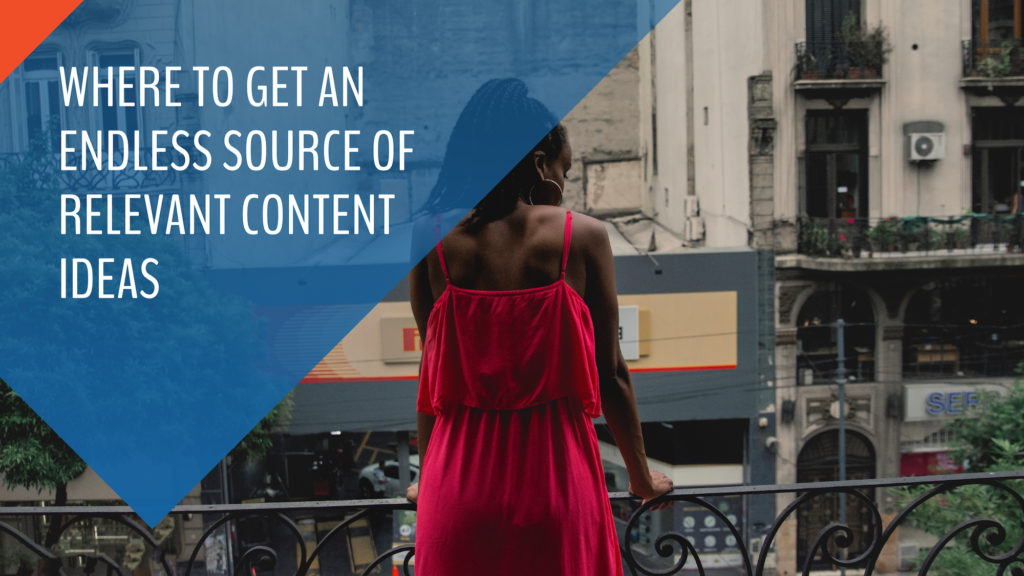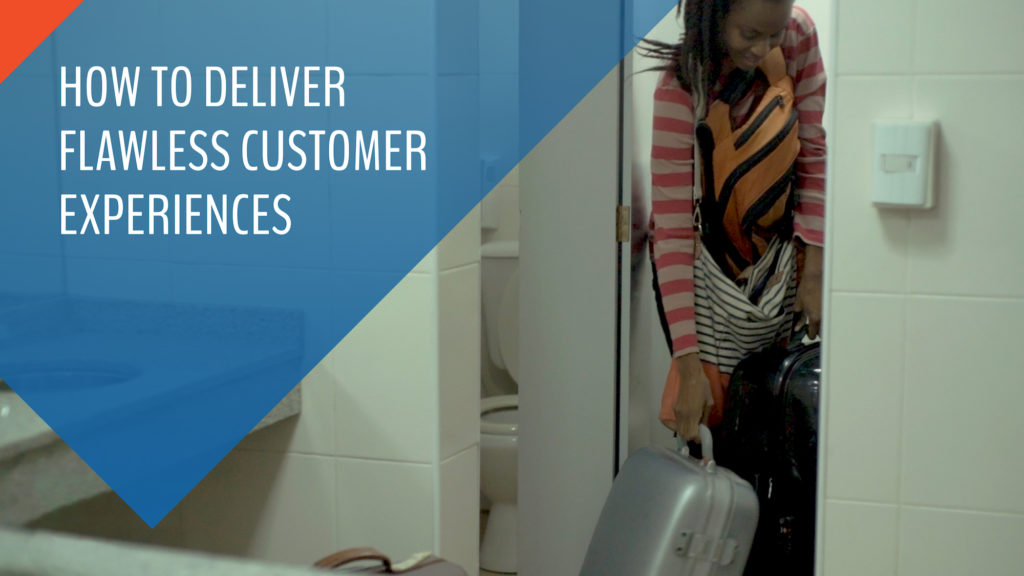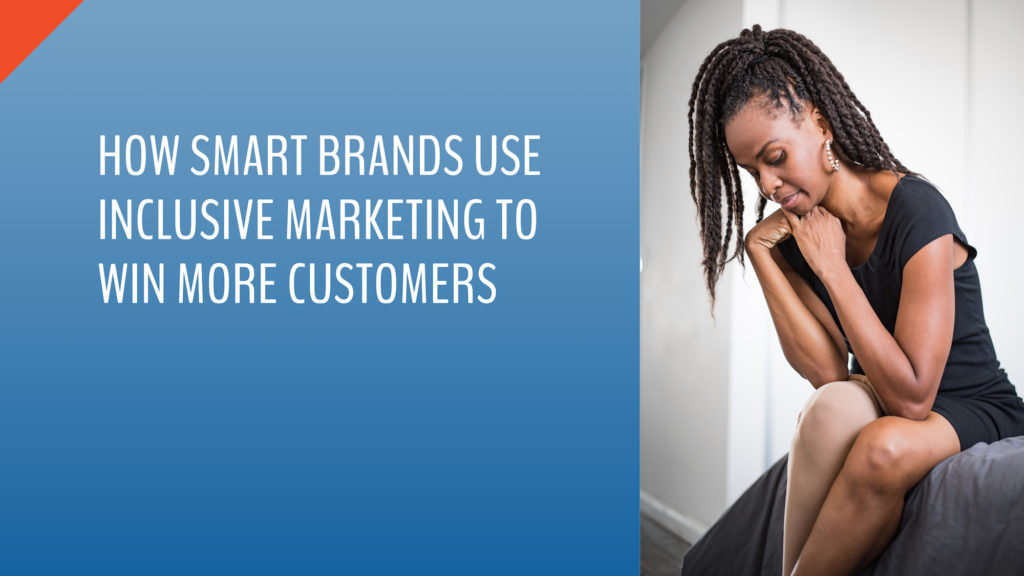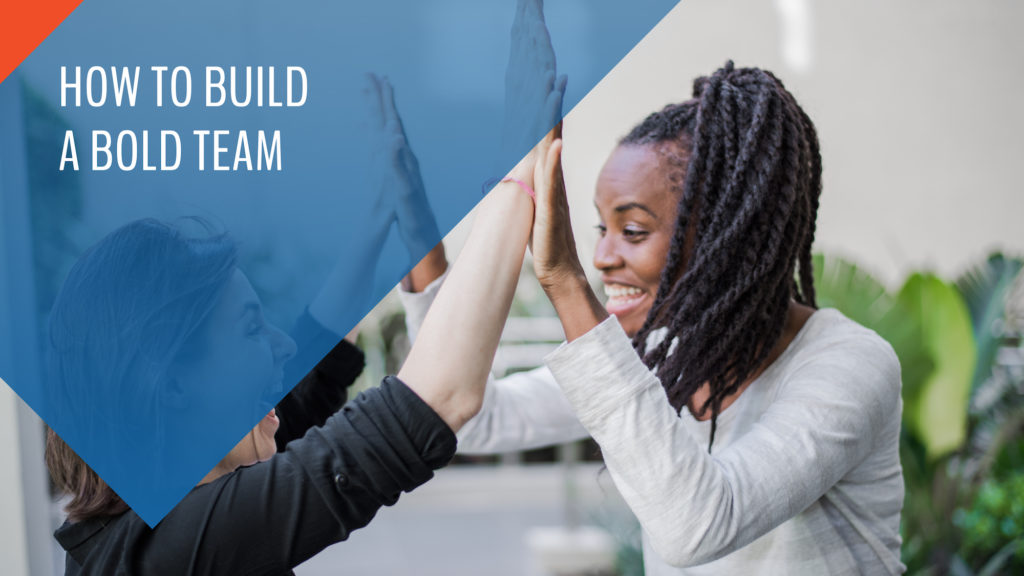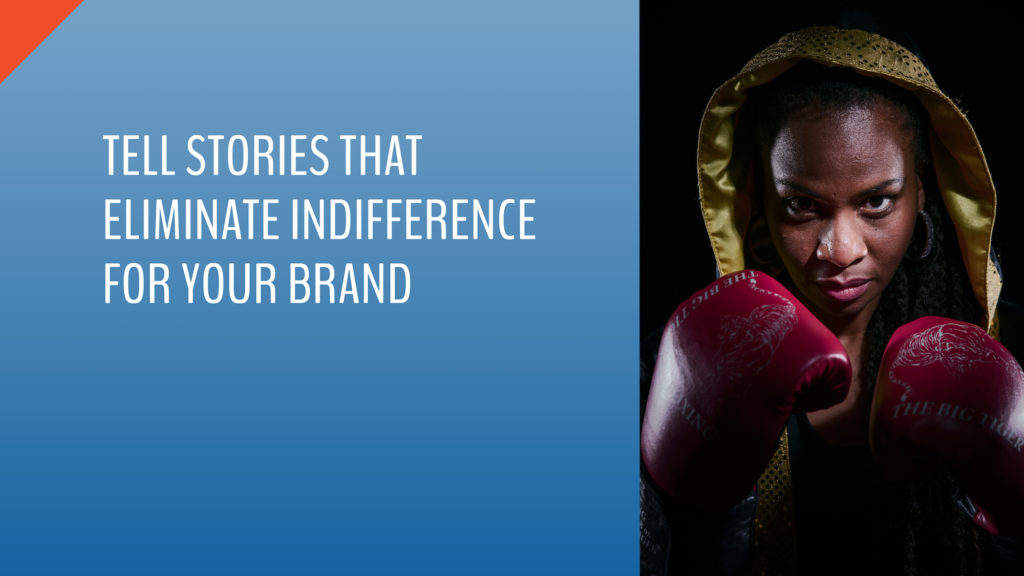Today we are talking about. how to build a more inclusive company culture. Increasingly, the people you work with to grow your company are becoming more diverse – whether that’s team members, vendors, consultants, or contractors.
And you’ve got to be equipped to create an environment where everyone, especially the people you work with who have different backgrounds and experiences as you, feel like they belong with you.
That means you got to cultivate an inclusive company culture.
To dive into this topic, I chatted with Megan Williams, who’s a content strategy consultant who also runs Black Freelance, an online community for Black Freelancers.
We can learn a ton from Megan, in particular what she’s discovered about how your background influences the way you work.
Key points:
- Why the mainstream can’t always adequately solve the needs of minority team members (and what to do about it)
- How your culture impacts the way you work (whether you know it or not)
- How to foster a greater sense of unity on your team
- What shapes the fundamentals of your skillset within your field
- Why some leaders and companies struggle to find diverse talent (ans what to do about it)
- The 1 thing you need to do to make everyone on your team feel like they belong
- The dialogue you need to get more comfortable having
Listen to the 26-minute episode here:
Watch the episode here:
Read a transcript of the episode here:
The unique challenges that diverse talent experience
Sonia Thompson: Hey Megan, thank you so much for joining me today. How are you?
Megan Williams: I am fine, thank you for having me.
Sonia: Oh, it’s my pleasure. All right, well let’s go ahead and dive right in. This is a very interesting topic, that I know a lot of people probably have questions about, but don’t really know where to go to get some of their questions answered. They might even feel a little nervous about asking some of these questions, which they shouldn’t be, we need more of an open dialogue.
Let’s start with talking about the organization you run, Black Freelance.
Megan: Yes. I run blackfreelance.com, it has been up for I think four years now. We just hit the four year anniversary. I shouldn’t say we, because it’s just me. I’m the only one doing it, only one creating content there. But yeah, it is basically a home base for black freelancers. Anyone who’s interested in getting into freelancing, who’s currently freelancing and wants to grow their business some. It is a community site, it is a resource site, it’s just a place for people who want to learn more to come and just get better at what they’re doing.
Sonia: Got it. I’ve seen a part of it, I’ve been a part of your Twitter discussions, and you’ve got lots of valuable information on there.
I wonder, I’m sure there are plenty of people who might say, well there are resources out there for freelancers period. Why is it necessary to have “Black Freelance” versus just “freelancers”?
Megan: Right. I asked that question when I first started myself, is actually why there is a section on the site called “Why Black Freelance”. When I first started freelancing, you’re out there, you’re learning about things, and I started running into some general questions.
One of the things that people you will hear a lot of just mainstream freelancers advise people, is to post your picture online. So I started doing that, and I noticed that in a couple, maybe actually two specific situations, we were having really good back and forth, people seemed excited, and I saw them check my LinkedIn, and all of a sudden they disappeared. And my LinkedIn didn’t say anything different than my website, so that question is in my head. “Is this because I’m black?” And it might not have been. I didn’t know.
But what it made me realize was that I had no one to go to, to ask that kind of question, because I was a freelancer, and I might run into one or two black people, but there weren’t a lot. You can’t really get a feel for what’s going on just from talking to a couple of people.
It was that, but also as I started to talk to friends and family and let them know what I was doing, because it happened after a layoff, and people ask “oh hey, what are you doing right now? Have you found another job?” And it’s like, “oh no, I’m freelancing now.” And they’re like “oh really, how does that work?” And I just kept getting that question over and over again.
Sonia: Okay.
Megan: And then I started to get the question, or actually the statement that I didn’t know people like us could do that kind of thing.
Sonia: Oh wow.
Megan: Right. And once I heard that a couple of times, it made me realize not only that there was a need for a site for black freelancers, but that people’s … actually it made me realize that, but then as I started to build the site, and started listening to more people’s freelance stories, and that’s any freelancer, white, black, asian, hispanic, whatever. I started to notice how their businesses were shaped by their networks and the cultural experience they were having.
Sonia: Okay.
Megan: And it made me realize that people’s freelance experience are not culturally neutral. Everyone’s experience is shaped by something bigger than themselves. We need to start paying attention, I wanted to start paying attention to how black freelancers careers are shaped by their cultural experiences.
How your culture impacts the way you work
Sonia: So what does that mean exactly? I hear a lot of people talk about … when you think about your culture, sometimes it is so entrenched into who you are and the way you run a business, but it might not be something that other people consider or even feel like it’s even physical or noticeable. How would you articulate that, and do you have any examples of people who felt like, whether it’s black freelancers or other ones across the board, how their culture impacted their business and the way they run their business? I know you gave an example about your photo, but are there others?
Megan: Right. There are specific cultural examples, and then there’s just the social and network implications.
One of the things, it actually kind of flipped on the head of what you probably think, but I remember one of the big mainstream problems people said they ran into was saying “oh, I don’t have a community anymore, I’m not meeting people.” I did that, I’m like, “I’m not having that problem. I still have my friends, and my family, and social organizations I’m in.” And I think that’s something that’s going to be particular to people who are from more collectivist societies, who might not see the workplace as a place of socialization. Where white Americans, they might be doing that.
Sonia: Okay.
Megan: But then there’s also just, where we come from as professionals. I know a lot of the members on Black Freelance now, they come in let’s just say from the writer perspective, and they want to write on social justice issues. I’m going to assume that most other groups of people don’t run into that kind of thing. That conversation to have, okay this is what your career might look like versus what I see on more mainstream or predominantly white freelance groups, where people are coming into freelancing from a professional perspective.
Sonia: Got it.
Megan: Not necessarily thinking of trying to address social issues because of their own experiences.
Sonia: Got it. I understand. Yes. I understand. So it’s one of those things where if you’re not necessarily of that group, or if it’s not even your experience. Because I know so much of the way we think about culture and cultural intelligence, I had a guest on recently, he said that so much of your culture and your way you think about how you relate to other people is shaped by your own experiences. So if you’re experiences look nothing like the experiences of some of the people that you’re interacting with, you might have to work a little harder to relate to each other and understand where each other is coming from.
Megan: Right. And that’s something that I personally deal with. Because my work as a freelancer is not race-based.
Sonia: Right.
Megan: I work very mainstream business, I am a B2B writer, there’s no racial or cultural, nothing overt to what I’m doing. So when I’m talking to someone who wants to write on social justice issues, just to use that example again, there are many things that I don’t understand that I’ve had to take time to sit back and listen and just watch their process and the challenges that they go through. Because it’s not something that I’m dealing with.
How to build an inclusive company culture
Sonia: Right. Got it.
I’ve heard this said quite a bit, about the US in particular, that we’re in this post-racial society, which I don’t believe is true. We do need, I do agree that we need to embrace our differences more, instead of trying to make everyone feel like we are the same and there are no differences between us. “We’re just humans, right?” That’s not the place where I would want people to get. But I understand, I hear people saying things like, “are groups like Black Freelance, or other types of groups that support different minority groups, are they more divisive than unifying in a time where we probably need more unity?” So what are your thoughts about that?
Megan: Well, my thought on any concept, or any question like that is that for you to see something as divisive means you thought there was unity before. If you thought there was unity before, please show it to me. It was not there. It’s one of those things where it’s easy to think a house is clean when the lights are off. I think that’s what some people are going through.
To me, I do not think, from my experiences, I don’t see anything that’s more divisive.
Sonia: Okay.
Megan: A site like Black Freelanc is bringing more people into freelancing. If someone sees that as divisive, then we have a different definition of what division and togetherness are.
Sonia: Got it. So, you’re existing, I know you were talking about there are specific issues that you guys are addressing. Like, let’s say somebody wanted to talk about social injustice, or should you put your photo on your website and have your photo be the brand? Are you covering the fundamental as well, or just very specific challenges that are unique to people of color?
Megan: Both. Because the fundamentals are shaped by the challenges. There are things, like say, choosing a niche. You’ll hear a lot of mainstream freelancers talk about that. That is a fundamental concept as a freelancer. But what you see as a niche is determined by where you come from. If you come from a background where there are a lot of lawyers, and a lot of doctors, you’re going to understand medicine and law. Or a lot of business people, you’re gonna understand business. If you’re coming from a background where you are involved deeply in community organizations, and everyone around you’s involved in the same thing, that’s where you’re going to lean, you’re going to feel that your expertise is.
Questions like that lead to bigger questions of earning potential, emotional investment in your work, and those are very fundamental questions, like how much can you earn as a freelancer? Someone who’s starting as say, oh, if someone’s husband was a doctor, and that’s where they start doing their social media work, is coming from a very different income place than someone’s who’s coming from a background in the not for profit sector. And what feels natural to them.
Sonia: Okay.
Megan: It’s a lot of the same thing, honestly.
Sonia: Got it. Now, you and I talked previously, a while back on this topic, and you kinda brought it up when you were saying that whenever you were starting freelancing, people were like “Oh, I didn’t know that I could do that.” I’ve heard people talk about diversity, and let’s say they’re putting a panel together, or a round of discussion, or they’re building a network of people that they can tap into for jobs. A lot of times I’ve heard people say that their traditional means of looking for candidates or people or freelancers, sometimes it fuels them to hire people who look like them more so. And it’s not as easy for them to find, particularly within some of the mainstream channels, people of color, people who have a diverse background, and different backgrounds that they may not be used to.
So what are your thoughts on the role that Black Freelance and other groups like yours play to help bring more qualified people into the candidate pool, so that they can start infiltrating the supplier pool, the freelance pool, and just the talent that’s out there for people to be able to tap into?
Megan: Well, there’s a lot going on in that question.
Sonia: I know!
Megan: I think there’s a very different dynamic going on in employment organizations and freelance relationships.
Sonia: Okay.
Megan: For one, I have, when I was employed, I was employed probably 15 years, and I never got a referral from anyone I worked with for a job. That is completely different in freelancing. My experiences racially have been very different in freelancing than they had been in employment. I think as far as that’s concerned, for freelancers, not saying that racism doesn’t play a part, but what you are able to contribute weighs more heavily on the freelance side, just because you’re not part of an organization together.
On the employment, and on the organizational side, I think it’s one of those questions that has to start internally. I think there is an incorrect assumption that a lot of people in business, and a lot of people in any kind of organizational situation, they start from the point that they are neutral. They are not. One of the things I love most about business school is getting to study cultural differences between business, and one of my favorite theories that I ran across, I don’t know if it’s even still pertinent anymore, was Geert Hofstede’s Theory of Cultural Dimensions.
Sonia: Okay.
Megan: It places a lot of different countries on different scales, and different dimensions. From masculinity, their relationship with time, individualism, and one of the things it does, it places American culture, which is honestly, when they say it, it’s white American culture, on a scale.
Before you start asking the diversity question, and how to get more people in, I think it’s a question of taking a step back and understanding that our organization is most likely the way that we interact, and the way that we search for people, and the way that our networks are built are based on white American values. Which means they’re going to be more masculine, we’re going to be more individualist, we’re going to have much shorter time horizons. I think it has to start there. I don’t think that’s necessarily going to happen. But I do think it’s important for people to start there, before they get frustrated and say “oh, we can’t find people.” Well, it’s because you’re working within your comfort zone, and where you’re culturally comfortable.
Sonia: Got it. So whenever it comes to finding more diverse team members, whether that’s somebody to hire or somebody that you want to work with or partner with as a freelancer, contractor, etc. If I hear what you’re saying is, you really have to abandon the mainstream way that you traditionally go, and basically kind of fish where the fish are. And enter into some of the more places where you’re more likely to find qualified candidates that fit the diverse criteria that you’re looking for.
Megan: Yeah, if that is a genuine priority. If that is really what you want to do, you have to accept that that takes work. Even for me, say in Black Freelance, because I come from one a traditional business background, I also come from a very traditional internet business background. This is the first racially-based project that I’ve really done. I had to take a step back and say what I have learned about meeting people, and creating content, and creating demand, is based on this specific culture. How do I change that? And I still have to ask that question every day.
It is difficult, I have to examine myself and my habits and results, and I have to listen to people, and I have to understand that it means that I might have to sacrifice profitability and comfort and time. And if people aren’t really willing to do that, I would question the genuine intent of their initiatives.
Sonia: Yeah. It’s interesting. Because sometimes I felt like, and you and I have talked about this before, sometimes I kinda feel like I operate in two worlds, right? And I think part of it is because of my background in corporate America, so going back to what you were saying about your starting point of how things work, and when we go to school, we got to business school, we learn how things work that’s more so based upon the norm, right? So whenever I left my corporate job and started my own business, I continued along those same paths.
I noticed that I followed the people that I learned from, a lot of my mentors, a lot of the organizations that I’m part of, the conferences that I go to, those are very much what I would probably consider more mainstream environments. And whenever I go to those types of events, I am generally maybe the only black person in the room, one of very few black people in the room. Very few black women in the room. But that’s kind of the norm that I’ve operated in.
Now I have some other people in my network, colleagues, friends, they have the exact opposite experience. They are very much entrenched into a black network. Where it’s their learning environment, their mentors, etc., are all based in this different nucleus. And not to say that anyone is right or wrong, it’s just that they both exist. They’re kind of two different worlds that don’t always cross. So I think any time anybody wants to try and figure, I think it probably benefits people to be able to figure out how to cross both of those worlds, so you know how to interact, engage, operate, and know that it’s not that there’s necessarily a lack of talent, you just need to know where you should be looking to find it.
Megan: Yeah. I think that, you also have to be willing to look. I also think, like I said, I’ve never been a part of a diversity initiative, and as far as I know, I’ve never been a target. You never really know. I think a lot of organizations, again, need to take a step back and look at-, because every organization has experience with diversity. They’ve had, it’s 2018. You’ve had people in your organization.
I think it’s worth asking the question what you are bringing people in to? Asking what kind of success rate you’ve had with diverse people within your organization? Are you paying them fairly? What is their job satisfaction experience like compared to more mainstream employees? You might have issues internally that are influencing even the way that you create your diversity initiatives. I think that’s a question organizations should be asking, even before they start any kind of initiative.
That might be happening, I have no idea.
Sonia: Right.
Megan: That’s my thought on it.
Sonia: Do you feel that there needs to be organizations, professional organizations within a company that serves the needs-, like I know we call them Employee Resource Groups whenever I was a part of my corporate job. And I think sometimes people felt like they were beneficial, other times they thought, well, we’re not really sure. But we often as employees who were part of them, viewed them as a safe space to talk about issues that again, were very specific to what our experience was, that other people might not have been able to recognize. Do you feel like, from your experience, listening to some of the people that you’ve been mentoring through Black Freelance, that this is something that is beneficial across the board, both within companies and within professional organizations as well?
Megan: I don’t know, from the people I’ve spoken with, because a lot of the people, honestly, when you get to the point of freelancing, especially black people, you’re probably just fed up.
Sonia: Okay.
Megan: An internal organization is not gonna make any difference, I’m done. Or I’m scared, or I just don’t wanna try this.
I think it goes back to motive. What is the organization’s … do you care about your employees in the first place? My professional background, I will say, is I’ve worked for small companies, I’ve worked for larger companies, and start-ups. But none were very invested, well the small company was, but none of the larger ones who were like, large enough to have that kind of program, they didn’t really care.
Sonia: Right.
Megan: It wasn’t something they invested in. It really wasn’t. HR departments were pretty awful and very elementary. So I’ve never gotten to see what that looks like.
Sonia: Okay.
Megan: But like anything else in business, you know what a mission statement is, and if this does not tie into your mission statement, it’s not going to work. That’s a general rule in any organization.
Why having a diverse team is an asset
Sonia: Got it. Now, going back to, I think a lot of businesses are starting to understand the importance of how diversity impacts their bottom line. As they think about the changing demographics and makeup of their customer group, particularly in the US, as you become more global, and that how it is important to have an employee base that often reflects the customers that you’re trying to serve. Do you see this as an opportunity for the freelancers that you’re working with, and even other freelancers, contractors, people of color, to be able to step in and provide a level of guidance and expertise that’s needed?
Megan: If you understand it, I think there’s a lot of opportunity, from especially like a consulting standpoint. Maybe not so much from a freelance standpoint. But, you know, it all depends. There’s a lot of different kinds of freelance work out there. One thing I always encourage people to do, is I get a lot of people coming in from, say, a blogging background, or just a general internet content creation. Black freelance isn’t just writers, I wanna be clear, but I get a lot of writers that come in and ask questions.
Sonia: Right.
Megan: But a lot have a specialization and understanding of say, let’s just use makeup as an example, if you understand black skin and black makeup trends, you have a specialization. You have a niche that could appeal to larger companies, that could appeal to brands who are looking to reach out to different populations. And they might not be interested in investing internally and building those teams, so they might seek freelancing as a solution to that.
Sonia: Right.
Megan: There is opportunity there. That’s something you kind of usually have to sell though, because there’s a lot of services that people offer, that corporations do not know are out there.
Sonia: Right.
Megan: Even like what I do, most companies don’t know that someone with my spec-, I’m niched down very deep, four or five levels. They don’t know I exist, so I have to step out and let them know I’m there. Most recruiters, and most project managers and whatever aren’t getting on Google and searching for “black makeup blogger expert consultant.” Or whatever. You’re not gonna look for that. There’s a connection issue there. I think there is opportunity, but you have to go out and find it.
Sonia: Got it. Megan, this has been a great discussion. And I think a needed one. Hopefully people will feel like they can open the dialogue, or have somebody that they can come and talk to if they have any specific questions about this, because I think that’s how we are able to get to a common ground, and better understanding.
People are always welcome to come and talk to me, you’re open to them if they come to you, I’m sure. You have lots of discussions on Twitter in particular with your audience and people who are willing to engage.
Any parting words of wisdom for people who are figuring out how they can tap into people of color, who can really help them serve their customers better, create more meaningful experiences for them?
Megan: Start internally. You really have to start, you have to really ask yourself, are you willing to engage with people, and respect them, and take the time and investment. That’s where it all starts.
Sonia: All right, and where can people find you if they wanna learn more?
Megan: I am on blackfreelance.com. On Twitter, I am @blackfreelance1, because somebody owns @blackfreelance, and they haven’t used it in forever. So on Twitter, I’m @blackfreelance1, Black Freelance on Facebook, you can find me pretty much anywhere.
If you wanna email me, connect@blackfreelance.com, ask me questions, because questions help me learn what’s actually going out there, and serve people better.
Sonia: Neat. Thank you again.
Megan: Thank you.
Show notes:
Free Mini-Course: The Customer Magnet Playbook
Free Mini-Course: The Customer Magnet Playbook
7 Essential elements your business needs to consistently win more customers
- Framework based upon in the trenches experiences from 150+ business and thought leaders
- Science-based explanations to support why the elements of the blueprint work
- Action items to help you get some quick wins
